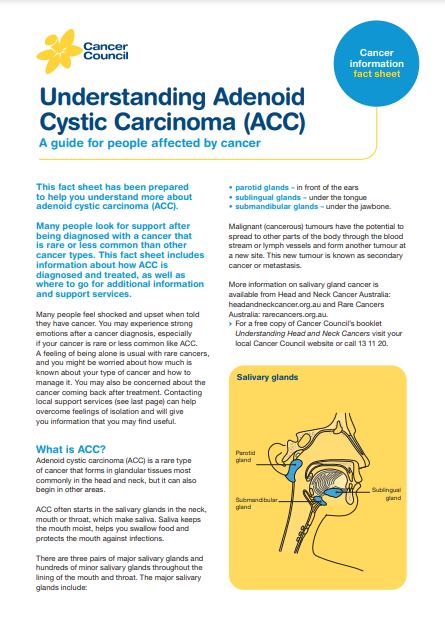- Home
- Adenoid cystic carcinoma (ACC)
- About ACC
About adenoid cystic carcinoma (ACC)
In this section we look at adenoid cystic carcinoma (ACC), how it is diagnosed and treated, as well as where to go for additional information and support services.
Learn more about:
Overview
Many people feel shocked and upset when told they have cancer. You may experience strong emotions after a cancer diagnosis, especially if your cancer is rare or less common like ACC.
A feeling of being alone is usual with rare cancers, and you might be worried about how much is known about your type of cancer and how to manage it. You may also be concerned about the cancer coming back after treatment. Contacting local support services can help overcome feelings of isolation and will give you information that you may find useful.
What is adenoid cystic carcinoma (ACC)?
Adenoid cystic carcinoma (ACC) is a rare type of cancer that forms in glandular tissues most commonly in the head and neck, but it can also begin in other areas.
ACC often starts in the salivary glands in the neck, mouth or throat, which make saliva. Saliva keeps the mouth moist, helps you swallow food and protects the mouth against infections.
There are three pairs of major salivary glands and hundreds of minor salivary glands throughout the lining of the mouth and throat.
The major salivary glands include:
- parotid glands – in front of the ears
- sublingual glands – under the tongue
- submandibular glands – under the jawbone.
Salivary glands

Malignant (cancerous) tumours have the potential to spread to other parts of the body through the blood stream or lymph vessels and form another tumour at a new site. This new tumour is known as secondary cancer or metastasis.
More information on salivary gland cancer is available from Head and Neck Cancer Australia, Rare Cancers Australia and from our general section on Head and neck cancers.
Who gets ACC?
ACC is rare and may account for up to a quarter of salivary gland malignancies. Around 330 Australians are diagnosed with a salivary gland cancer each year (this is 1.2 cases per 100,000 people). Estimates of 0.3 to 0.5 cases per 100,000 people each year have been reported for ACC in other countries.
While ACC can develop at any age, it is more common in people 40 to 60 years old. Slightly more females are diagnosed than males.
What causes ACC?
The cause of ACC is not known. It might develop from genetic changes that happen during a person’s lifetime, rather than inheriting a faulty gene. ACC is not considered to be hereditary.
→ READ MORE: Adenoid cystic carcinoma symptoms
Podcast for people affected by cancer
Listen now
A/Prof Dion Forstner, Radiation Oncologist, St Vincent’s Hospital, Sydney, NSW; Nick Kelly, Consumer; Caitriona Nienaber, 13 11 20 Consultant, Cancer Council WA.
View the Cancer Council NSW editorial policy.
